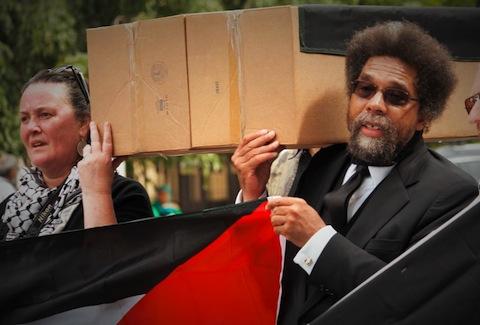According to the Washington Post:
Sen. Bernie Sanders was given unprecedented say over the Democratic Party platform Monday in a move party leaders hope will soothe a bitter split with backers of the longshot challenger to Hillary Clinton — and Sanders immediately used his new power to name a well-known advocate for Palestinian rights to help draft Democratic policy.
The senator from Vermont was allowed to choose nearly as many members of the Democratic Party platform-writing body as Clinton, who is expected to clinch the nomination next month. That influence resulted from an agreement worked out this month between the two candidates and party officials, the party announced Monday.
Clinton has picked six members of the 15-member committee that writes the platform, and Sanders has named five, the Democrats said Monday ahead of an expected announcement by the Democratic National Committee.
Even more amazing were Sanders’s choices for the committee: Cornel West; Keith Ellison, who is both the first Muslim elected to Congress and the first African American elected to Congress from Minnesota; Jim Zogby, a longtime voice on behalf of Palestinian rights; Native American activist Deborah Parker; and environmental writer and climate-change activist Bill McKibben.
However insignificant, power-wise, Sanders’s choices may be — his people will constitute about a third of the total committee — they are highly significant in terms of the discussion in this country around Israel/Palestine, as Haaretz rightly pointed out.
Because so much of Israel/Palestine politics in this country depends upon keeping certain voices and arguments out of the mainstream, the very fact that Sanders has chosen Cornel West — who in addition to self-identifying as a socialist, is also a long-standing critic of Israel and firm supporter of the boycott, divestment, and sanctions movement (BDS) — as well as Zogby and even Ellison, as his representative on the platform committee, is a big deal.
West, Zogby, and Ellison are now the voices of not only Sanders but also of the not-insignificant sector of Sanders voters within the Democratic Party.
Israel/Palestine has always been a curious issue in American politics: on the one hand, it’s one tiny piece of the world; on the other hand, it plays an outsized role in US foreign policy and political culture, for all sides of the debate.
That Sanders has chosen to make that one issue a kind of line in the sand of his particular brand of politics — when so many of us had thought he’d simply the ignore the issue altogether — suggests to me that it will play a large role in the coming realignment of American politics.
Not only will this be a marker for a younger generation of Jews — of how they can be Jewish and left without supporting Israel (and that non-support can run the gamut of outright anti-Zionism, for someone like me, or simply being more critical of Israel than is the norm in the United States or in the Democratic establishment) — but it will also be a marker for a new generation of socialist-inclined leftists and liberals.
As this other Washington Post article from 2012 suggests, platform committees and party platforms aren’t so important in terms of whether and how they constrain a president; they don’t. They are important in terms of laying down markers of where a party is or may be going. Let’s keep a close eye on this one.
The new issue of Jacobin is out now. Buy a copy, a discounted subscription, or a commemorative poster today.


Spread the word